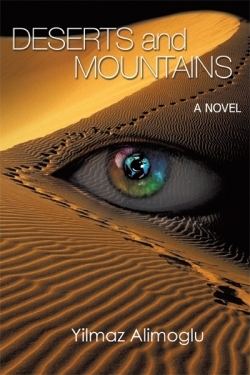Deserts and Mountains
Ali Dogan, a Turkish Sufi living in Canada, was deeply troubled. His marriage was crumbling and his life was not flowing in the way he knew it should. He realized that the time had come for a pilgrimage to sort out the dichotomies in his life. Ali tied up loose ends and left for Turkey to begin making a “map of his heart,” as his spiritual adviser suggested.
Comparisons to Eat, Pray, Love can be made since both books are about finding one’s self, take the protagonist to various countries, and are very well-written. Though Ali is not drawn to food, he is after answers about love and God. Deserts and Mountains could be the Sufi male’s cerebral equivalent of Elizabeth Gilbert’s bestseller.
In writing an introduction to Sufi philosophy, geography, and writings, Alimoglu did an extraordinary job. He effortlessly wove page after page of beautiful and profoundly meaningful prose into Ali’s conversations and musings. The reader will need to keep a tissue, pen, paper, and close friend near, as the urge to cry, record, and share will feel unavoidable at times. His observations about the people and cultures he encounters, extrapolated brilliantly into statements about human behavior, give almost constant pause. From the craven begging of a taxi driver in Mali with four wives and seventeen children to the jaw-dropping wisdom of a fellow pilgrim Ali meets in the desert, Deserts and Mountains will satisfy, both emotionally and spiritually.
In Istanbul, Ali begins a chaste relationship with Nour, a divorced woman who fears for her life at the hands of male relatives and her ex-husband. Ali is loathe to believe such a thing is possible in the twenty-first century in the country of his birth, but he is wrong. Grief-stricken and disillusioned with humanity, he goes to Germany to join his uncle on a humanitarian mission to Africa. Before they can leave, he has an emotional collapse and spends several days in the hospital.
Almost against his will, Africa transforms and seduces him. At first, Ali is repulsed by everything and everyone, but upon deep reflection, he comes to an understanding that opens his heart, “We eliminate some of our selfishness by working for the good of others unselfishly.”
The book ends exactly as it should. The sacred thread that weaves through Deserts and Mountains can be discerned in the words of a sheikh Ali sits with in Timbuktu: “The soul awakens and grows through grief and joy, each in its time. It has always been this way.”
Reviewed by
Patty Sutherland
Disclosure: This article is not an endorsement, but a review. The publisher of this book provided free copies of the book and paid a small fee to have their book reviewed by a professional reviewer. Foreword Reviews and Clarion Reviews make no guarantee that the publisher will receive a positive review. Foreword Magazine, Inc. is disclosing this in accordance with the Federal Trade Commission’s 16 CFR, Part 255.

